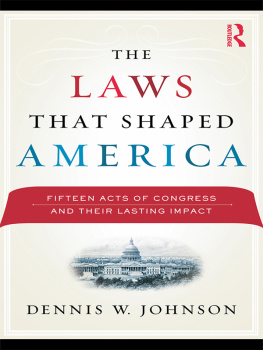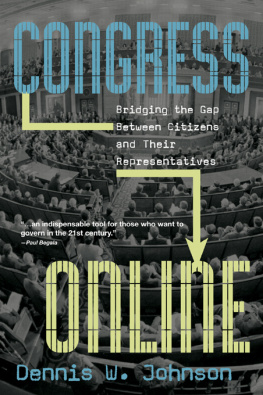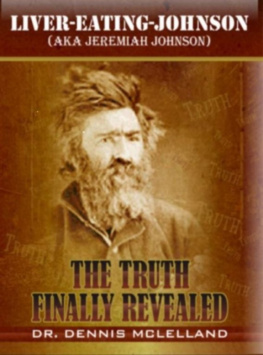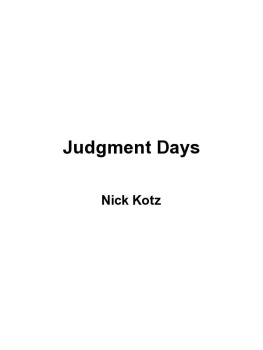THE LAWS THAT SHAPED AMERICA
I have greatly enjoyed reading The Laws That Shaped America, a fast-moving narrative, with colorfully drawn settings and nuanced descriptions of major players. Dennis Johnson addresses major themes fundamental to lawmaking and representative democracy while effectively illustrating the inherent frustration, sluggishness, complexity, and unpredictability of the legislative process. He has brilliantly mastered a vast amount of source material with proper tone, balance, and emphasis. I learned a great deal from this book.
Richard Baker, author of The Senate of the United States: A Bicentennial History
Dennis Johnsons The Laws That Shaped America is an invaluable scholarly resource. Most scholars and serious students will know the basic story of how fundamental laws, like the Northwest Ordinance, the Land Grant College Act, the Social Security Act, and the Voting Rights Act were passed, but few will know the full back stories in all their fascinating detail. This is policy history at its best. Dennis Johnsons fine book goes on the shelf right next to David Mayhews classic Divided We Govern.
Cal Jillson, Southern Methodist University
Dennis Johnson has produced a masterly account of Americas landmark acts of Congress, which will be of interest to anyone interested in history and politics for years to come. It is both highly readable and exhaustive in its research. I highly recommend this book.
Robert B. Dove, Parliamentarian Emeritus of the United States Senate
For better and sometimes for worse, Congress is a reflection of the aspirations, wants, and priorities of the American people. During each two-year session of Congress, thousands of pieces of legislation are proposed, many hundreds are given serious consideration, but far fewer are eventually enacted into law. Most enactments have limited impact, affect few, and are quietly forgotten in the flow of legislative activity. However, a small number of laws have risen to the level of historical consequence. These are the laws that have shaped America, and they are the subject of this book.
Dennis W. Johnson tells the story of fifteen major laws enacted over the course of two centuries of American democracy, for each looking at the forces and circumstances that led to its enactmentthe often tempestuous political struggles, the political players who were key in proposing or enacting the legislation, and the impact of the legislation and its place in American history.
Dennis W. Johnson is professor and former associate dean of the George Washington University Graduate School of Political Management, Washington, D.C.
THE LAWS THAT SHAPED AMERICA
Fifteen Acts of Congress and their Lasting Impact
Dennis W. Johnson

First published 2009
by Routledge
270 Madison Ave, New York, NY 10016
Simultaneously published in the UK
by Routledge
2 Park Square, Milton Park, Abingdon, Oxon OX14 4RN
Routledge is an imprint of the Taylor & Francis Group, an informa business
This edition published in the Taylor & Francis e-Library, 2009.
To purchase your own copy of this or any of Taylor & Francis or Routledges collection of thousands of eBooks please go to www.eBookstore.tandf.co.uk.
2009 Taylor & Francis
All rights reserved. No part of this book may be reprinted or reproduced or utilized in any form or by any electronic, mechanical, or other means, now known or hereafter invented, including photocopying and recording, or in any information storage or retrieval system, without permission in writing from the publishers.
Trademark Notice: Product or corporate names may be trademarks or registered trademarks, and are used only for identification and explanation without intent to infringe.
Library of Congress Cataloging in Publication Data
Johnson, Dennis W.
The laws that shaped America: fifteen acts of congress and their lasting impact/by Dennis W. Johnson.
p. cm.
Includes bibliographical references and index.
1. LawUnited StatesHistory. I. Title.
KF352.J64 2009
349.73dc22
2009005998
ISBN 0-203-87758-6 Master e-book ISBN
ISBN10: 0-415-99972-3 (hbk)
ISBN 10: 0-415-99973-1 (pbk)
ISBN10: 0-203-87758-6 (ebk)
ISBN13: 978-0-415-99972-4 (hbk)
ISBN 13: 978-0-415-99973-1 (pbk)
ISBN13: 978-0-203-87758-6 (ebk)
TO THE MEMORY OF MY DEAR WIFE LINDA BUCHANAN JOHNSON (19482009)
PREFACE
All legislative Powers herein granted shall be vested in a Congress of the United States, which shall consist of a Senate and House of Representatives.
Article I, section 1, U.S. Constitution
We have in this country the greatest law factory the world has ever known.
Charles Evans Hughes (1924)
On the morning of June 10, 1964, the lawmakers were exhausted but flush with anticipation. First-term senator Robert C. Byrd (DemocratWest Virginia) had kept his colleagues up throughout the night with a fourteen-hour, thirteen-minute speech, a last-ditch effort to stop consideration of the pending civil rights legislation. Byrd, forty-six years old and young by Senate standards, was the final speaker in a coordinated filibuster that had begun in late March and stretched over seventy-five calendar days, consuming nearly six million words in the Congressional Record, protesting the legislation, arguing for states rights, pontificating far and wide, trying to stall passage of the Civil Rights Act of 1964. Southern Democrats, led by Richard B. Russell of Georgia, formed a platoon system, coordinated by three old bulls, Allen J. Ellender of Louisiana, John C. Stennis of Mississippi, and J. Lister Hill of Alabama. Each of these wily veterans stage-managed a team of six senators, which would take its turn speaking non-stop on the Senate floor.
For many Washington tourists, the ornate Senate gallery was just another stop along the way through the gleaming U.S. Capitol. A group of Roman Catholic nuns, school children, and tourists dressed in shorts and T-shirts were in the gallery. But crowded together in the back of the Senate chamber and up in the gallery were some 150 House members, former senators, and congressional staffers; hundreds of others waited outside in a long line. Scattered throughout the visitors gallery were a few African-Americans, including Clarence Mitchell, director of the Washington chapter of the NAACP, who listened intently. History was about to be made.
Promptly at 11:00 a.m., the clerk began calling the roll. Mr. Aiken. Aye, announced George D. Aiken (RepublicanVermont). Mr. Allott. Aye, replied Gordon Allott (RepublicanColorado). When the clerk got down to E, the Senate reached a moment of high drama, rarely seen in its history.
Senator Clair Engle (DemocratCalifornia), fifty-two, once a handsome and rugged liberal who had earned the sobriquet Congressman Fireball, was now a mere shadow of his once robust self. His fragile, wracked body slumped in a wheelchair, gently guided onto the Senate floor by an aide. Ten months earlier, Engle had undergone an operation to remove a malignant brain tumor, with more surgery in April; since then his condition had deteriorated to the point where he could not walk, could barely move his arms, and was unable to utter a word. Clair Engle was the hundredth senator present, and he was determined to have his vote count. Gallery spectators watched in respectful silence as several times Engle weakly lifted his crippled arm, pointed to his eye, and tried to mouth the word Aye. There were tears in the eyes of many of his distinguished colleagues. Senate procedure did not require that a vote be uttered out loud, and Engles vote was recorded in the Aye column, along with what turned out to be seventy-one votes, four more than needed, to cut off the filibuster.














